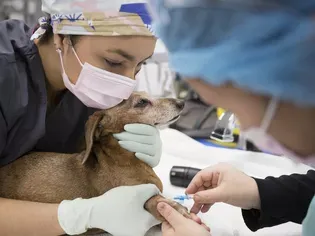Hookworms in Dogs
Updated on 05/27/24

Hookworms in Dogs: A Comprehensive Guide for Pet Owners
Hookworms are intestinal parasites that can infest dogs of all ages, causing a range of health problems. Understanding their biology, symptoms, diagnosis, and treatment is crucial for responsible pet ownership. This comprehensive guide delves into the intricacies of hookworms in dogs, empowering you to safeguard your furry companion's well-being.
Hookworm Biology and Lifecycle
Hookworms are long, roundworms that attach to the lining of the dog's small intestine. They feed on the animal's blood, leading to anemia and other health complications. The lifecycle of a hookworm involves several stages:
- Adult hookworms: These reside in the dog's intestines, where they produce eggs.
- Eggs: Hookworm eggs pass through the dog's stool into the environment.
- Larvae: Eggs hatch into microscopic larvae that live in the soil or grass.
- Infective larvae: Larvae penetrate the dog's skin or are ingested through contaminated water or soil.
- Adult hookworms: Larvae migrate through the body and mature into adult hookworms in the dog's intestines, completing the lifecycle.
Symptoms of Hookworm Infection
Hookworms can cause various symptoms in dogs, depending on the severity of the infestation:
- Anemia: Hookworms feed on the dog's blood, leading to anemia, characterized by pale gums, weakness, and lethargy.
- Gastrointestinal symptoms: Vomiting, diarrhea, and abdominal pain can occur due to intestinal irritation.
- Weight loss: Severe hookworm infestations can result in weight loss as the dog struggles to absorb nutrients.
- Blood in stool: Heavy hookworm infections can cause bloody diarrhea due to the worms attaching to the intestinal lining.
- Cough: In some cases, hookworm larvae can migrate to the lungs, causing a cough.
Diagnosis and Treatment
Diagnosing hookworm infection in dogs typically involves:
- Fecal examination: A microscope is used to examine a sample of the dog's stool for the presence of hookworm eggs.
- Blood test: A blood test can detect anemia and other abnormalities associated with hookworm infection.
Treatment for hookworm infection involves deworming medications, such as:
- Fenbendazole: This medication effectively kills adult hookworms.
- Pyrantel pamoate: This medication is commonly used to treat hookworm infections in puppies.
Prevention and Control
Preventing hookworm infection in dogs is essential for maintaining their health:
- Regular deworming: Dogs should be dewormed at regular intervals, especially during puppyhood, as they are more susceptible to infection.
- Control environmental exposure: Keep your yard clean of animal waste and avoid letting your dog roam in areas where hookworms are likely to be present.
- Use preventive medications: Veterinary-approved medications can help prevent hookworm infection and should be used as directed by your veterinarian.
Examples of Hookworm Infections in Dogs
To illustrate the potential impact of hookworm infection in dogs, consider these real-life examples:
- Max, a young Golden Retriever: Max developed severe anemia due to a heavy hookworm infestation. He experienced extreme weakness, lethargy, and pale gums. Prompt deworming and supportive care saved his life.
- Bella, an elderly Beagle: Bella had a chronic hookworm infection that caused intermittent vomiting and diarrhea. She lost a significant amount of weight and became very weak. With consistent deworming and supportive measures, her condition gradually improved.
Conclusion
Hookworms are a serious threat to the health of dogs. Understanding their biology, symptoms, diagnosis, and treatment is essential for responsible pet ownership. By implementing preventive measures and seeking veterinary care promptly when symptoms arise, you can protect your furry companion from the devastating effects of hookworm infection. Remember, your dog's well-being depends on your vigilance and proactive actions.
Explore More Pets

Basic Training
Puppy and Baby Introductions

Working Dog Breeds
All About Search and Rescue Dogs

Dog Treatments
Puppy Vaginitis: Signs, Causes and Treatment

Dog Adoption
After More Than 1,200 Days in the Shelter, Coco Goes Home

Basic Training
How to Train Your Puppy to Go on Potty Pads

Hybrid Dog Breeds
The Difference Between a Mutt, Mixed Breed, or Designer Dog?

Dog Treatments
Nail Problems in Dogs

Puppies
7 Reasons Why Two Dogs Are Better Than One
